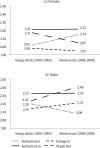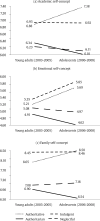Raising Generation Z Children in China: Parenting Styles and Psychosocial Adjustment
- PMID: 40385638
- PMCID: PMC12082050
- DOI: 10.5093/pi2025a9
Raising Generation Z Children in China: Parenting Styles and Psychosocial Adjustment
Abstract
Objective: This study aims to analyze the relationship between parenting styles, i.e., authoritative, indulgent, authoritarian, and neglectful, and psychosocial adjustment, i.e., aggression, self-concept, and emotional-social competence, among Generation Z (Gen Z) individuals. Method: The participants were 1,417 Chinese individuals, 736 young adults (born between 2003-2005) and 681 adolescents (born between 2006-2008). A multivariate multifactorial design 4 × 2 × 2 × 2 was applied. Dependent variables were various components of child psychosocial adjustment (aggression, five dimensions of self-concept and emotional-social competence). Independent variables were parenting styles, children antisocial tendency during adolescence, sex, and age (adolescent vs. young adult cohorts). Results: Children from authoritarian homes reported higher levels of aggression, and the worst scores in self-concept and emotional-social competence. By contrast, the optimal results were consistently associated with warm parenting (i.e., authoritative and indulgent). Conclusions: Parental warmth was beneficial for Gen Z, including both adolescent and young adult cohorts. The present findings seriously questioned that the Chinese authoritarian parenting, which has often been related to positive outcomes-particularly for educational success-is beneficial for child psychosocial adjustment.
Keywords: Aggression; Antisocial tendency; Gen Z; Parenting styles.
Copyright © 2025, Colegio Oficial de la Psicología de Madrid.
Conflict of interest statement
Conflict of Interest: The authors of this article declare no conflict of interest.
Figures
Similar articles
-
Raising Spanish Children With an Antisocial Tendency: Do We Know What the Optimal Parenting Style Is?J Interpers Violence. 2021 Jul;36(13-14):6117-6144. doi: 10.1177/0886260518818426. Epub 2018 Dec 14. J Interpers Violence. 2021. PMID: 30547714
-
Raising Children with Poor School Performance: Parenting Styles and Short- and Long-Term Consequences for Adolescent and Adult Development.Int J Environ Res Public Health. 2019 Mar 27;16(7):1089. doi: 10.3390/ijerph16071089. Int J Environ Res Public Health. 2019. PMID: 30934673 Free PMC article.
-
A Third Emerging Stage for the Current Digital Society? Optimal Parenting Styles in Spain, the United States, Germany, and Brazil.Int J Environ Res Public Health. 2019 Jul 2;16(13):2333. doi: 10.3390/ijerph16132333. Int J Environ Res Public Health. 2019. PMID: 31269653 Free PMC article.
-
Parental Socialization, School Adjustment and Cyber-Aggression among Adolescents.Int J Environ Res Public Health. 2019 Oct 19;16(20):4005. doi: 10.3390/ijerph16204005. Int J Environ Res Public Health. 2019. PMID: 31635096 Free PMC article.
-
Parenting Styles and Aggression Among Young Adolescents: A Systematic Review of Literature.Community Ment Health J. 2019 Aug;55(6):1015-1030. doi: 10.1007/s10597-019-00400-0. Epub 2019 May 17. Community Ment Health J. 2019. PMID: 31102163
References
-
- Ali S, Khaleque A, Rohner R. P. Pancultural gender differences in the relation between perceived parental acceptance and psychological adjustment of children and adult offspring: A meta-analytic review of worldwide research. Journal of Cross-Cultural Psychology. 2015;46(8):1059–1080. doi: 10.1177/0022022115597754. - DOI
MeSH terms
LinkOut - more resources
Full Text Sources
Medical


